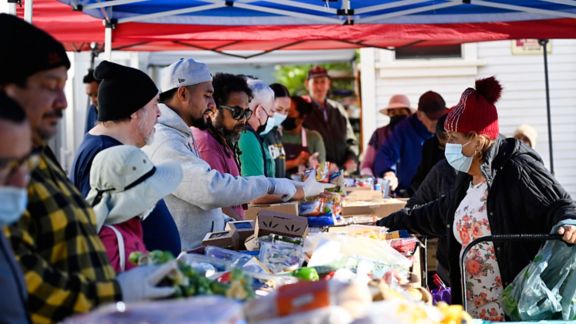Community-Engaged Research on Gambling in Massachusetts

Problem
There are limited perspectives from community members on casinos and online sports betting in Massachusetts.
Public opinion of casinos and legalized gambling is both mixed and nuanced. Research shows that underserved communities often are disproportionately negatively impacted by gambling. However, little research has focused on the effects of casinos on the people who live and work in the host community or surrounding communities. While casino gambling became legal in Massachusetts in November 2011, sports wagering was only recently legalized in 2023. As Massachusetts implements new policies and regulations, research on the impending impact of sports betting legalization and implementation remains limited and lacks a community perspective.
Solution
We used community engagement principles to inform gambling research and examine the local policy impact.
In 2021–2022, Massachusetts Gaming Commission (MGC) funded NORC and its partner, the Institute for Community Health (ICH), to capture perspectives on the Encore Boston Harbor Casino and how it has affected the day-to-day quality of life of people in the casino’s surrounding communities. We established a community advisory board and a team of community interviewers to engage participants living and working around the casino in the study’s research design, data collection, analysis, and dissemination of findings. Our work included 47 interviews in five languages with community members of different backgrounds.
In 2023, MGC re-engaged NORC to conduct additional community-engaged research on the health, social, and economic impacts of sports wagering on local communities. NORC is using community-engaged research methods to gather perspectives from Massachussetts communities, particularly those of young adults, to understand how they have been affected by the recent legalization of sports betting in Massachusetts.
Result
The 2021–2022 study found that community perspectives on legalized casino gambling are mixed and nuanced.
Though difficult to disentangle from the COVID-19 public health emergency and other economic factors, participants had mixed perspectives on the effects of the casino on the local economy, including employment, housing, and small businesses, and on social and environmental factors. The majority of participants believed that the casino has negatively affected the mental health of community members. Negative effects include increased stress and alcohol use.
Participants expressed that casinos had differing effects on communities based on socio-demographics, and these perspectives should be considered in gambling research. The hosting municipal government should assess the benefits or harms of casino enterprises on individuals living in surrounding communities. They also recommended that the casino and local governments should more actively engage community members in decision-making and to understand community needs and preferences.
Additional findings on community perspectives on sports wagering are forthcoming.
Learn More About This Study
For more on the Massachusetts Gaming Commission's research agenda, visit their webpage for this work.
Related Tags
Project Leads
-
Jenna T. Sirkin
Principal Research ScientistProject Investigator -
Petry S. Ubri
Senior Research ScientistImplementation Lead








